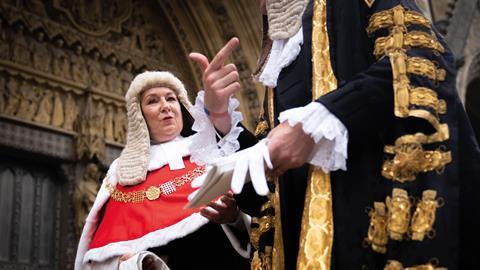Lady Carr wants to build public understanding of how the justice system works and make the judiciary more inclusive
Three months after becoming the first lady chief justice, Baroness Carr of Walton-on-the-Hill appeared before the House of Commons justice select committee on Tuesday to talk about her new job.
The LCJ has three stated ambitions: recognise and promote judicial strength; build judicial unity; reduce backlogs, improve timeliness and maintain quality.
Her judges are Carr’s ‘biggest asset’. But asked if society does enough to promote the values of the judicial system, Carr said communication and understanding are key. ‘The better we communicate and the more the public understands what we do, the stronger will be the message. We do a lot in the commercial sector with the City and UK plc to promote [international work]. The Treasury, I hope, is fully aware of the literal value of the work that we do.
‘But across the board, and I know this committee has done a lot of work in the criminal sentencing arena, does the public understand enough [about] how valuable we are, not just in money terms, but in societal terms across the board, and how this unravels across to the health sector, to the education sector, to the housing sector?
‘We aren’t in a silo. We don’t live and work in a silo. To improve understanding as to how we intermesh with all parts of life is something I’d like to work on.’
Key to better understanding is transparency – Carr has set up a transparency committee, to be chaired by a specialist judge. Its object will be to promote access to justice – not just broadcasting from the courts, but also access (including by journalists) to documents and information. ‘We know that so many members of the public know what we do from what they read and see in the media. So, if I can get high-quality reporting across the board, and make that as easy as possible, I’m happy.’
'We work in a hierarchical world with routes of appeal, but outside the court we are all equal. It doesn’t mean we don’t need leadership, but sometimes the voice of the most experienced magistrate may be much more relevant and powerful than the voice of a senior High Court judge'
Baroness Carr, lady chief justice
Praising Family Division president Sir Andrew McFarlane’s work on opening up the family courts to journalists, Carr said the new committee, which she wants to be ‘cross-jurisdictional’, will ‘piggyback’ on this ‘exceptional’ work.
On judicial unity, Carr needs a ‘legislative slot’ to get the structural change needed to build ‘One Judiciary’. This aims to bring the courts and tribunals closer together in terms of resources, culture and identity.
‘One Judiciary’ is already making a difference on cross-deployment, Carr acknowledged. But she also wants to make the judiciary more inclusive outside the hearing rooms. ‘We, by definition, work in a hierarchical world with routes of appeal, but outside the court we are all equal. It doesn’t mean we don’t need leadership, but sometimes the voice of the most experienced magistrate may be much more relevant and powerful than the voice of a senior High Court judge.’
Asked about the increasingly threadbare courts estate, Carr said her job is to make sure HM Courts & Tribunals Service knows of all the problems. At Snaresbrook Crown Court, Carr bumped into a judge going down to the cells to sentence someone, because the panic alarms in court had broken down. Serious problems affect performance, with knock-on effects on security and morale, she said.
Her ‘long-term ambition’ would be a separate funding stream ‘for what is an endemic, ingrained problem across the estates’.
On bringing down the Crown court backlog, the focus should be on timeliness. Factors affecting this include a high volume of work, fewer guilty pleas, estate problems, prison overcrowding and the bar. ‘We had the strikes. I’m not talking about the strikes anymore. I’m talking about the fact when [former director of public prosecutions] Max Hill KC retired, he was saying he couldn’t find barristers to prosecute his cases.’
Carr’s best offer to improve timeliness? Focus on the early weeks of a case. ‘That means frontloading. Frontloading so defendants get access to as much disclosure as early as possible, with the best legal advice possible to make the right decisions as early as possible, so that those cases that are not going to go to trial are disposed of as quickly as possible and are out of the system.’
Getting the best legal advice early ‘spills into a discussion, perhaps for another day, about criminal legal aid, perhaps legal aid across the board. My own view is frontloading in all jurisdictions is, if not mandatory, then desirable. Legal aid and the legal aid provisions in crime would have a role to play here’.
This article is now closed for comment.





































1 Reader's comment